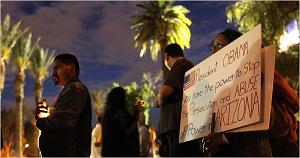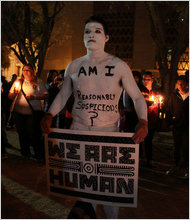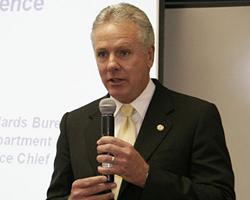 Arizona is well accustomed to the derision of its countrymen.The state resisted adopting Martin Luther King’s birthday as a holiday years after most other states embraced it. The sheriff in its largest county forces inmates to wear pink underwear, apparently to assault their masculinity. Residents may take guns almost anywhere, but they may not cut down a cactus. The rest of the nation may scoff or grumble, but Arizona, one of the last truly independent Western outposts, carries on.Now, after passing the nation’s toughest immigration law, one that gives the police broad power to stop people on suspicion of being here illegally, the state finds itself in perhaps the harshest spotlight in a decade.
Arizona is well accustomed to the derision of its countrymen.The state resisted adopting Martin Luther King’s birthday as a holiday years after most other states embraced it. The sheriff in its largest county forces inmates to wear pink underwear, apparently to assault their masculinity. Residents may take guns almost anywhere, but they may not cut down a cactus. The rest of the nation may scoff or grumble, but Arizona, one of the last truly independent Western outposts, carries on.Now, after passing the nation’s toughest immigration law, one that gives the police broad power to stop people on suspicion of being here illegally, the state finds itself in perhaps the harshest spotlight in a decade.
The law drew not only the threat of a challenge by the Justice Department and a rebuke from the president, but the snickers of late-night comedians. City councils elsewhere have called for a boycott of the resort-driven state; one trade group of immigration lawyers has canceled a conference planned for Scottsdale at a time when the state is broke and desperate for business. Meanwhile, a continuous protest is taking place at the State Capitol.
Bruce D. Merrill, a polling expert here, is tired of picking up his phone. “Usually it is somebody asking me, ‘What the hell is going on in Arizona?’ ” Mr. Merrill said.But while Arizona may have become a cartoon of intolerance to much of America, the reality is much more complex, and at times contradictory. This state is a center of both law and order and of new age om. Red-meat-loving. Red-rock-climbing.
Arizona is home to some of the toughest prison sentencing laws in the country, and one of the cleanest campaign finance laws, too. Voters overwhelmingly re-elected Janet Napolitano, a Democrat, as governor the same year they returned the conservative senator Jon Kyl to Washington. The current Republican governor signed this law, but is also pushing for a tax increase.
Further, while Arizona may seem on the fringe with its immigration law, the measure mirrors the 1994 battle in California over a voter-approved law that Gov. Pete Wilsonsigned barring illegal immigrants from getting health care, public education and other services. Like California then, Arizona is taking its own tack instead of waiting on the federal government to change policies.
“The political and emotional landscape is almost identical,” said Dan Schnur, director of the Jesse M. Unruh Institute of Politics at the University of Southern California, who served as an aide to Mr. Wilson. “History doesn’t repeat itself, it just moves east.”
The table was set for the passage of the new law by a confluence of factors, say residents, political scientists and businesspeople in Arizona. Those factors include shifting demographics, an embattled state economy and increased violence in Mexico, as well as the perception that the federal government has failed to act. Arizonans find that particularly irksome, given that Ms. Napolitano is now head of the Department of Homeland Security.
Hispanics make up 30 percent of the population here, up from roughly 25 percent in 2000, according to census data. As the state’s economy, largely dependent on construction and development, has slumped, hostility toward illegal immigrants has increased in recent years. “More people now seem to think Hispanics are taking jobs from Anglos,” said Mr. Merrill, the polling expert.
Further, laws like the immigration statute and another new law requiring political candidates to prove citizenship are generally written by the hard-right lawmakers who dominate the Legislature — with far-left-of-center minority members opposing them — but neither side reflects the relatively centrist political views of most residents.
More than 30 percent of registered voters here are independents, double the proportion in 2000. “People have been leaving both political parties, which leaves the remainders in the party much more ideological,” Mr. Merrill said.
Residents are unnerved by the violence in Mexico and the heavy drug trade and illegal immigrant trafficking in Arizona. Most studies have shown illegal immigrants do not commit crimes in a greater proportion than their share of the population, and Arizona’s violent crime rate has declined in recent years. But in this state any crime tied to illegal immigrants gets notice.
Half of the drugs seized along the United States-Mexico border are confiscated in Arizona, and it is a major hub for human smuggling. Last month, Robert Krentz, 58, a member of a prominent ranching family, was killed on his property 20 miles from the border, and the police said the gunman was probably connected to smuggling.
“People outside of Arizona are not living in this state and don’t understand the issue,” said Mona Stacey, a computer technician from Mesa. “Most of them coming across are mostly good, Catholic families getting over here. But you also have the drug lords and the smugglers. It makes the good guys look bad, and you don’t know who is who.”
Conversations here about the new law tend to begin or end with a reference to Ms. Napolitano, who personified the state’s blended politics. As governor, she backed the posting of National Guard troops on the border, expanded the use of the state police in antismuggling operations, and pressed Washington for an overhaul of immigration law.
When it came to the Maricopa County sheriff, Joe Arpaio, however — a staunch supporter of immigration enforcement and one of the highest profile figures on the issue — she took a largely hands-off approach.
Now, as Homeland Security secretary, she has played up the administration’s devotion of resources to the border, while resisting pressure to put National Guard troops there.
This, too, is an echo of California circa 1994. There, Proposition 187, the measure limiting services for illegal immigrants, was struck down by the courts (a possibility here, too, say legal experts). The Clinton administration responded with Operation Gatekeeper, an effort to strengthen the border in California. It ended up pushing trafficking east, and as a result, Arizona posts the highest number of people arrested for crossing along the 2,000-mile border.
The former director of Operation Gatekeeper has just been appointed President Obama’sCustoms and Border Protection commissioner.
With more rallies opposing the law set for Thursday, Sheriff Arpaio has planned another of his controversial sweeps to net illegal immigrants.
“Arizona is the most unpredictable political patch of earth I’ve ever seen,” said Chip Scutari, a former political reporter who now runs a Phoenix public relations firm. “It’s the land of Sheriff Joe Arpaio’s tough-as-nails Tent City, and super-liberal Congressman Raul Grijalva calling for a boycott of his own state. That’s Arizona.”




